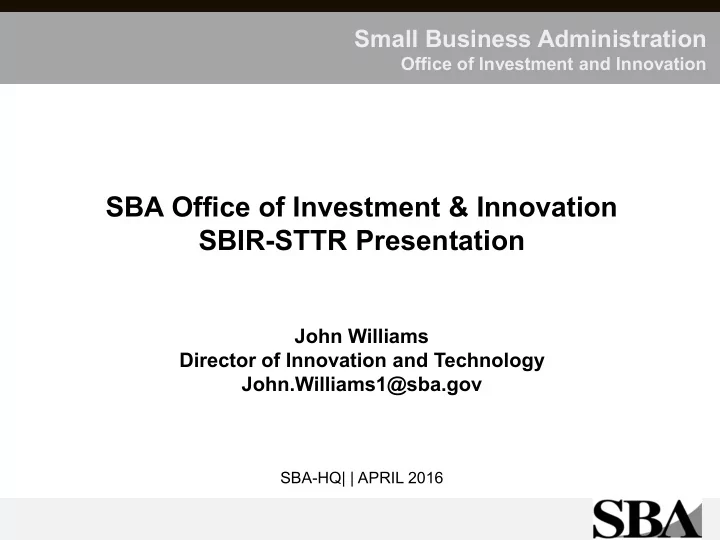

Small Business Administration Office of Investment and Innovation SBA Office of Investment & Innovation SBIR-STTR Presentation John Williams Director of Innovation and Technology John.Williams1@sba.gov SBA-HQ| | APRIL 2016
Small Business Administration Office of Investment and Innovation Questions?
Mission of the SBIR/STTR Programs To support scientific excellence and technological innovation through the investment of Federal research funds in critical American priorities to build a strong national economy…one small business at a time 3 Small Business Administration
Goals of the SBIR/STTR Program Meet Federal research and development needs Increase private-sector commercialization of innovation derived from Federal research and development funding Stimulate technological innovation Foster and encourage participation in innovation and entrepreneurship by socially and economically disadvantaged persons 4 Small Business Administration
The Small Business Innovation Research (SBIR) Program A set aside program for small business to engage in Federal R&D with potential for commercialization 3.0% of the extramural research budget for Fy16 (FY15 ~2.2 Billion in summation) for all agencies with a budget greater than $100M per year. Growing to 3.2% by 2017 FY FY FY FY FY FY FY 2011 2012 2013 2014 2015 2016 2017 SBIR 2.5% 2.6% 2.7% 2.8% 2.9% 3.0% 3.2% Legislation has passed House Small Business and working through Senate Small Business – It is possible that program will be reauthorized early in 2016 5 Small Business Administration
Agencies that Participate in the SBIR program Department of Agriculture (USDA) Department of Commerce (DoC) Department of Defense (DoD) Department of Education (ED) Department of Energy (DOE) Department of Health and Human Services (HHS) Department of Homeland Security (DHS) Department of Transportation (DOT) Environmental Protection agency (EPA) National Aeronautics and Space Administration (NASA) National Science Foundation (NSF) 6 Small Business Administration
Small Business Technology Transfer (STTR) program SBIR STTR A sister set-aside program to facilitate cooperative R&D Phase 1 duration ~6 months ~12 months between small business # participating 11 5 concerns and U.S. research agencies institutions – with potential for Size Phase I award ~ $150,000 ~ $150,000 commercialization % extramural R&D 3.00% 0.45% budget [FY16] IP allocation No Yes 0.45% of the extramural agreements required research budget (>$250 million) RI or FFRDC No Yes for all agencies with a budget participation greater than $1B per year. required PI employment Small Small business business or RI Applicant Small Small business business 7 Small Business Administration
These Programs Make a Difference SBIR/STTR Success Stories Qualcomm • Symantec • iRobot • Genzyme • Nimble Systems • NanoMech • Lift Labs • Adaptec • Ecovative Design • Children’s Progress, Inc. • JENTEK Sensors • Squid • 8 Small Business Administration
SBIR/STTR is a gated process - with three Phases Phase I Phase II Phase III ~Concept Development ~Prototype Development Commercialization ~6 months ~24 months No SBIR funding ~ $150,000 ~$1,000,000 Program is designed to be extremely flexible so scope of work, dollar amounts, period of performance are adapted to the need 9 Small Business Administration
Eligibility Criteria Organized as for-profit U.S. business Small: 500 or fewer employees, including affiliates Work must be done in the U.S. (with few exceptions) Individual Ownership: Greater than 50% U.S.- owned by individuals and independently operated OR Greater than 50% owned and controlled by other business concern/s that is/are greater than 50% owned and controlled by one or more individuals OR Be a concern which is more than 50% owned by multiple venture capital operating companies, hedge funds, private equity firms, or any combination of these. 10 Small Business Administration
Principal Investigator (PI) Must be employed by the SBC at time of award (i.e. primary employeer) Principal Investigator (PI) is not required to have a Ph.D./M.D. The PI is required to have appropriate expertise to oversee project scientifically and technically Applications may be submitted to different agencies for similar work Awards may not be accepted from different agencies for duplicative projects This is also a grey area as many projects have overlap work so focus needs to be on not charging twice for same work. 11 Small Business Administration
Application Process for SBIR/STTR Typical Application Process Solicitation Topics Proposal Submission Evaluation Phase I or II Award 12 Small Business Administration
Required registrations vary by agency 13 Small Business Administration
FY 2015 Distribution of Total SBIR/STTR Budget 14 Small Business Administration
New Resources for Stakeholders Coming July, 2016 Target Audience SBCs interested in learning more about SBIR/STTR [Primarily newbies] FireFox, Chrome Will be accessed from SBIR.gov Open to everyone Better prepare companies for meetings with Agency personnel Tool for trainers 10 Courses Release: July 1, 2016 16 Small Business Administration
Course List Course 1: Program Basics Course 2: Finding Topics Course 3: Agency Introductions Course 4: Agency Solicitations Course 5: Registration Requirements Course 6: Proposal Preparation Course 7: Finding Partners Course 8 Accounting and Finance Course 9: SBIR Data Rights Course 10: CyberSecurity 17 Small Business Administration
Requests from the SBIR PM’s The SBIR PM’s need to have a better understanding of Where the Fraud issues are How that compares to non SBIR firms Best practices that help prevent Fraud Best practices that help identify Fraud Is there low hanging fruit Does anyone know what the cost of the Fraud is to the US Does anyone know what the cost we spend on identifying Fraud and how can we get the biggest bang for the buck What you would like to see the SBIR PM’s do to support your efforts 18 Small Business Administration
Small Business Administration Office of Investment and Innovation Thanks for your Time Contact me for follow up John.williams1@sba.gov
Recommend
More recommend